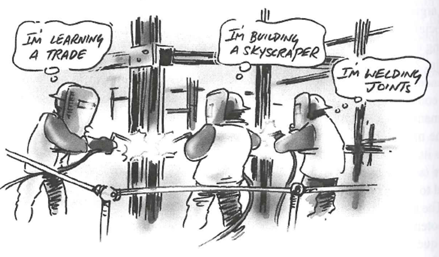3 Learning by experience
Learning by experience is a familiar idea but it implies two activities: learning and experiencing. Both activities need to happen if I am to say that learning from experience has happened. Experiencing seems to have two components. The first is the quality of attention that allows me to notice the experience and its components. The second is memory. Calling experience to mind allows me to examine the experience and to think about it in ways that were not possible at the time. Learning is what I take away from that process that influences my behaviour or thinking in the future.
But huge amounts of experience escape without being consciously experienced; I am insufficiently aware at the time to notice what’s going on. Later I am too busy to recall the experience and so little conscious learning takes place. Of course, it’s useful to carry out familiar activities ‘on auto-pilot’ – without conscious attention. It’s easy to miss out on important learning from unfamiliar activities too. I may become wrapped up in the activity itself or simply not notice the range and quality of the experience. Either way, a conscious attempt to recall the experience and to think about it, gives the opportunity to learn from the experience.
So, what was the purpose of asking you to do Activity 1? It should have allowed you to experience the start of this course as richly as possible. You were asked questions that should have prompted you into awareness of what you were experiencing. It may be you discovered something new about yourself; your expectations of the course; what you hope to gain from studying it; or about your capacity to succeed in it as a result. If not, don’t worry. The point of the activity was raising awareness rather than discovery; and recording material that will be useful in future learning and reflection.
Activity 2 Self-directed learning
Make a note of the components of your previous self-directed learning experiences which you have enjoyed most? Why?
Comment
Some people enjoy the initial meeting with new material most. Others enjoy testing their newly acquired understandings in exercises. Still others enjoy their new perspectives on things quite external to the course that their new understandings give them. Do any of these match your previous experience? If not, what was it for you? You may also like to explore the question of what you didn’t like. Have you changed in ways that might make your experience of this unit different?
What were you, as the learner, expected to do as you worked through previous self-study courses?
Many courses follow a fairly steady pattern of a bit of theory, followed by an example of what the theory means in practice, followed by an exercise where the learner applies what they have just learned to another situation. Do you recognise this pattern? Have you experienced it? Have you experienced variations on this theme? What were they? Have you experienced alternative approaches? How successful have these patterns been for you?

